Show your hands-on experience
Keep in mind, recruiters are likely to favor LPN applicants who can prove real-world experience. Be sure to detail your clinical rotations, duties performed, and the types of healthcare settings you've worked in.
Here are the keywords and skills that appear most frequently on recent Nurse job postings. In other words, these are the most sought after skills by recruiters and hiring managers. Go to Sample Templates ↓ below to see how to include them on your resume.
Remember that every job is different. Instead of including all keywords on your resume, identify those that are most relevant to the job you're applying to. Use the free Targeted Resume tool to help with this.
Does your resume contain all the right skills? Paste in your resume in the AI Resume Scan ↓ section below and get an instant score.
Paste your resume below and our AI will identify which keywords are missing from your resume from the list above (and what you need to include). Including the right keywords will help you get past Applicant Tracking Systems (i.e. resume screeners) which may scan your resume for keywords to see if you're a match for the job.
Go through the Nurse posting you're applying to, and identify hard skills the company is looking for. For example, skills like Patient Education, Hospitals and Cardiopulmonary Resuscitation (CPR) are possible skills. These are skills you should try to include on your resume.
The following word cloud highlights the most popular keywords that appear on Nurse job descriptions. The bigger the word, the more frequently it shows up on employer's job postings. If you have experience with these keywords, include them on your resume.
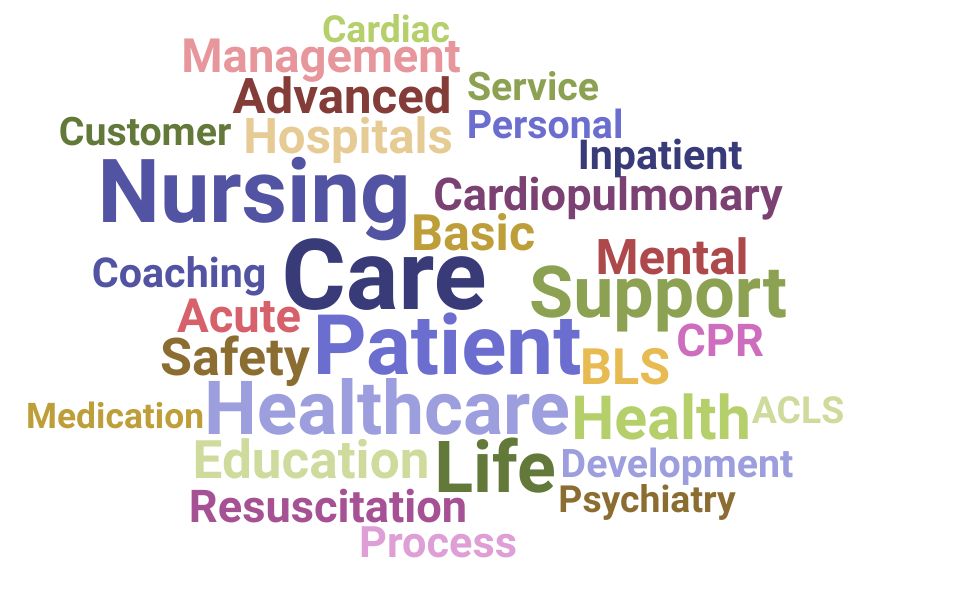
Here are common soft skills that appear on Nurse job postings. Unlike hard skills, which refer to tools, software or techniques, soft skills focus on character traits and interpersonal skills. Instead of listing these phrases on your resume, try to show them through your bullet points like in the examples below.
Tip: Do not list these words or phrases on your resume, and instead focus on the hard skills we described above.
Here are examples of proven resumes in related jobs and industries, approved by experienced hiring managers. Use them as inspiration when you're writing your own resume. You can even download and edit the resume template in Google Docs.
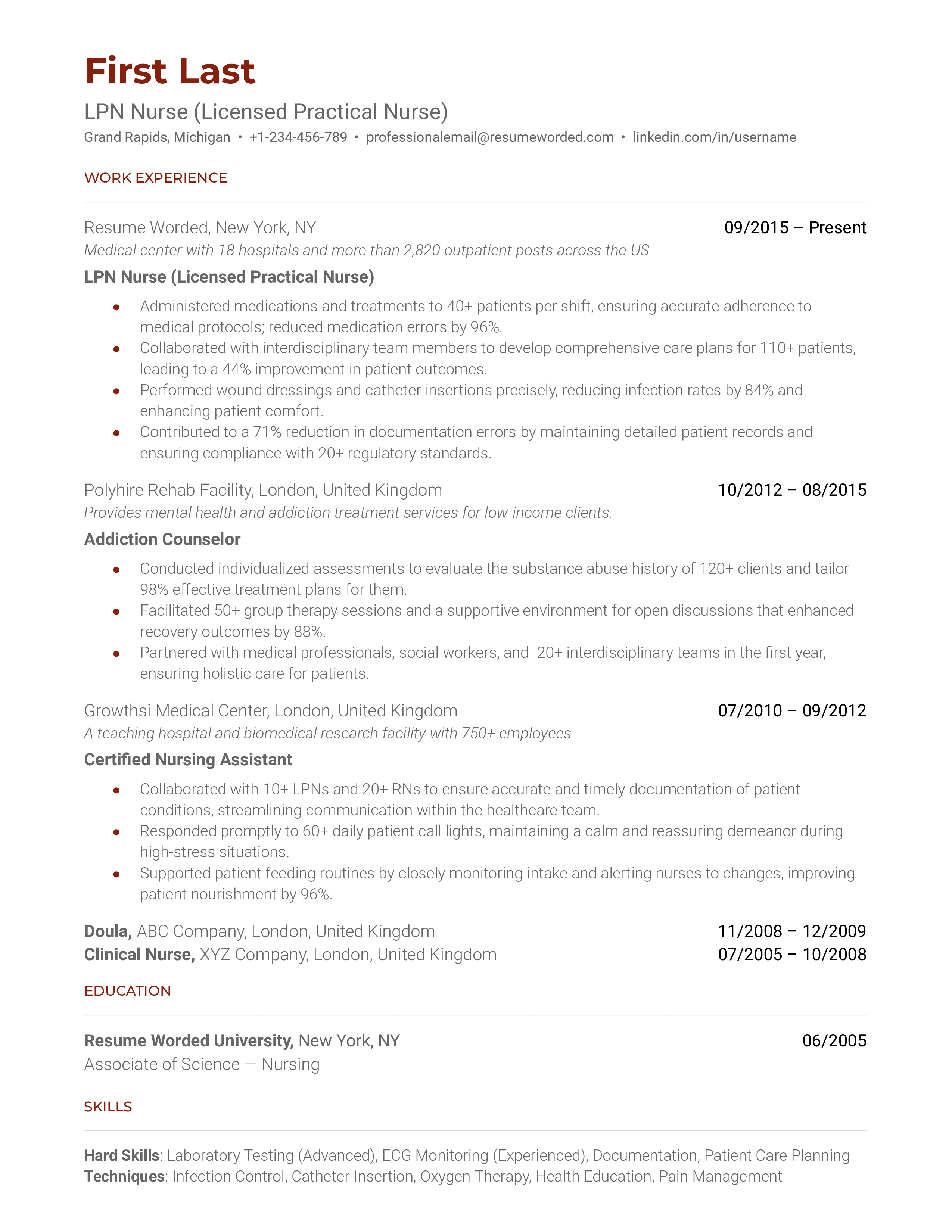
As you pursue a role in the world of nursing as a Licensed Practical Nurse (LPN), you must be prepared to showcase your unique blend of clinical skills and empathy. In recent times, healthcare settings are increasingly relying on LPNs not just for basic nursing care but for their ability to connect with patients. They appreciate LPNs who can balance human touch with technical proficiency. So, when drafting your resume, remember to present a compelling mix of your technical knowledge, patient care skills, and ability to work under pressure. The industry is moving towards more specialized care, which means your resume needs to emphasize any specific nursing skills or areas of expertise you've developed. Similarly, companies value LPNs who are continuous learners and are adapting to the evolving healthcare landscape. It's critical to demonstrate your commitment to ongoing education and upskilling on your resume.

Becoming a Licensed Practical Nurse (LPN) is all about showing you've got the chops to provide high-level care under the guidance of registered nurses and physicians. When crafting your resume, remember that it's not just about showing your clinical skills, but also demonstrating your ability to support patients emotionally. This field is rapidly changing with technologies like telemedicine and electronic health records becoming more prominent, which means you need to show you can keep up. Given that many LPNs work in elder care, where we're seeing a surge in demand, emphasize any relevant experience or skills in this area.
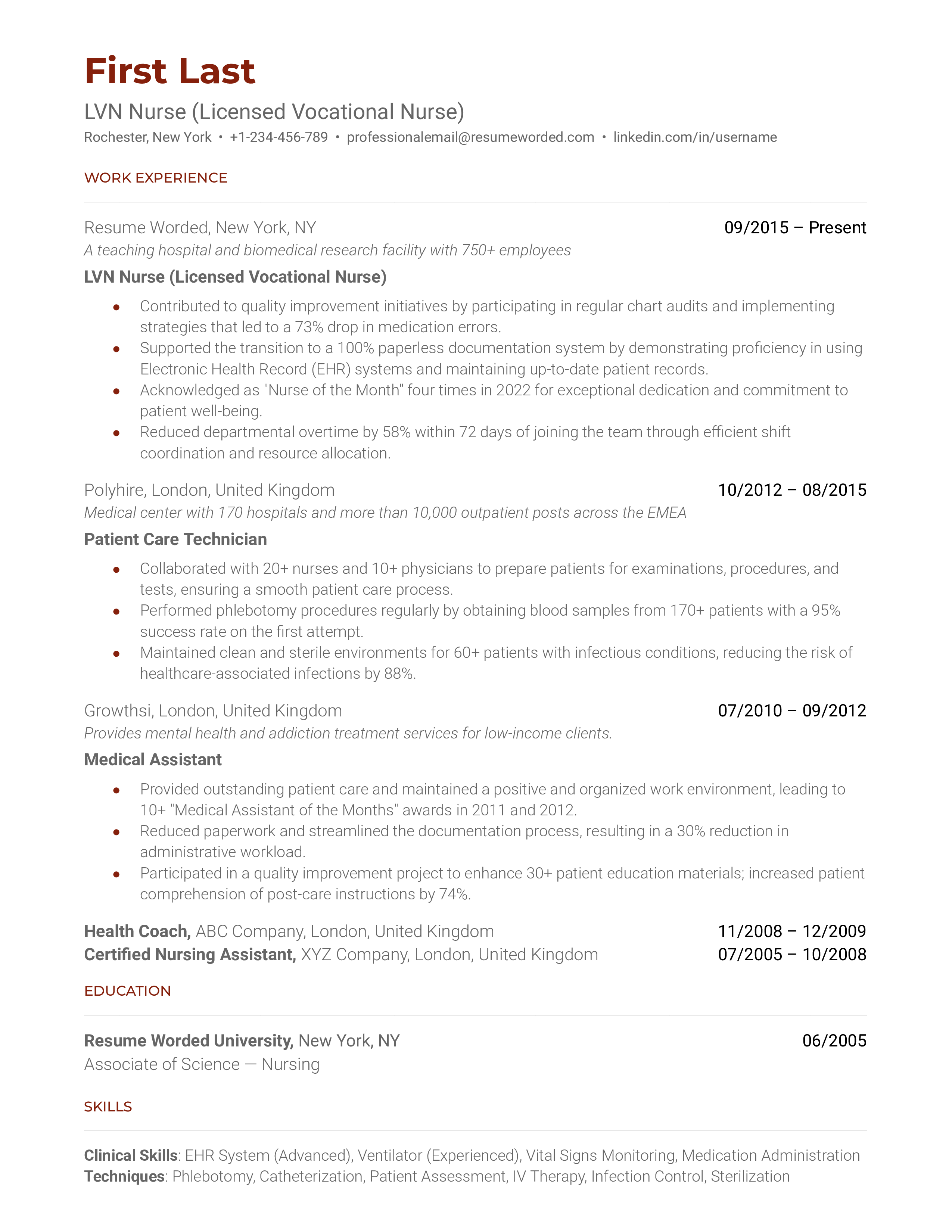
As a Licensed Vocational Nurse (LVN), you play a vital role in the healthcare industry, often serving as the backbone of patient care. Your resume should reflect your robust skills set — your ability to assist with diagnostic tests, take vital signs, and provide emotional support to patients. Recently, the industry's focus has increasingly shifted to holistic care, and as an LVN, you're more likely to work in interdisciplinary teams. When crafting your resume, it's essential to convey the breadth of your nursing skills and your ability to work well with a diverse set of professionals. In the ever-evolving world of healthcare, trends tend to focus on emerging technologies and automation of administrative duties. This doesn't reduce the value of an LVN, but rather increases the demand for interpersonal and technical skills. Your resume should show your adaptability to new technologies, and your knack for juggling both patient interaction and administrative tasks. Remember, your resume doesn’t just outline your past jobs—it tells your professional story, offering a glimpse into who you are as an LVN.

As an LVN (Licensed Vocicational Nurse), you have a key role in healthcare that is rewarding and challenging. The demand for LVNs is quite high due to an aging population and an increasing need for healthcare services. However, the competition for positions in prestigious facilities is as fierce as ever. Your resume, therefore, needs to clearly communicate your technical skills, hands-on nursing experience, and compassion for patients. And although patient care is paramount, do not underestimate the importance of displaying soft skills such as communication and teamwork. Keeping up-to-date with current trends, such as the shift towards home health care, can also give your resume an edge.
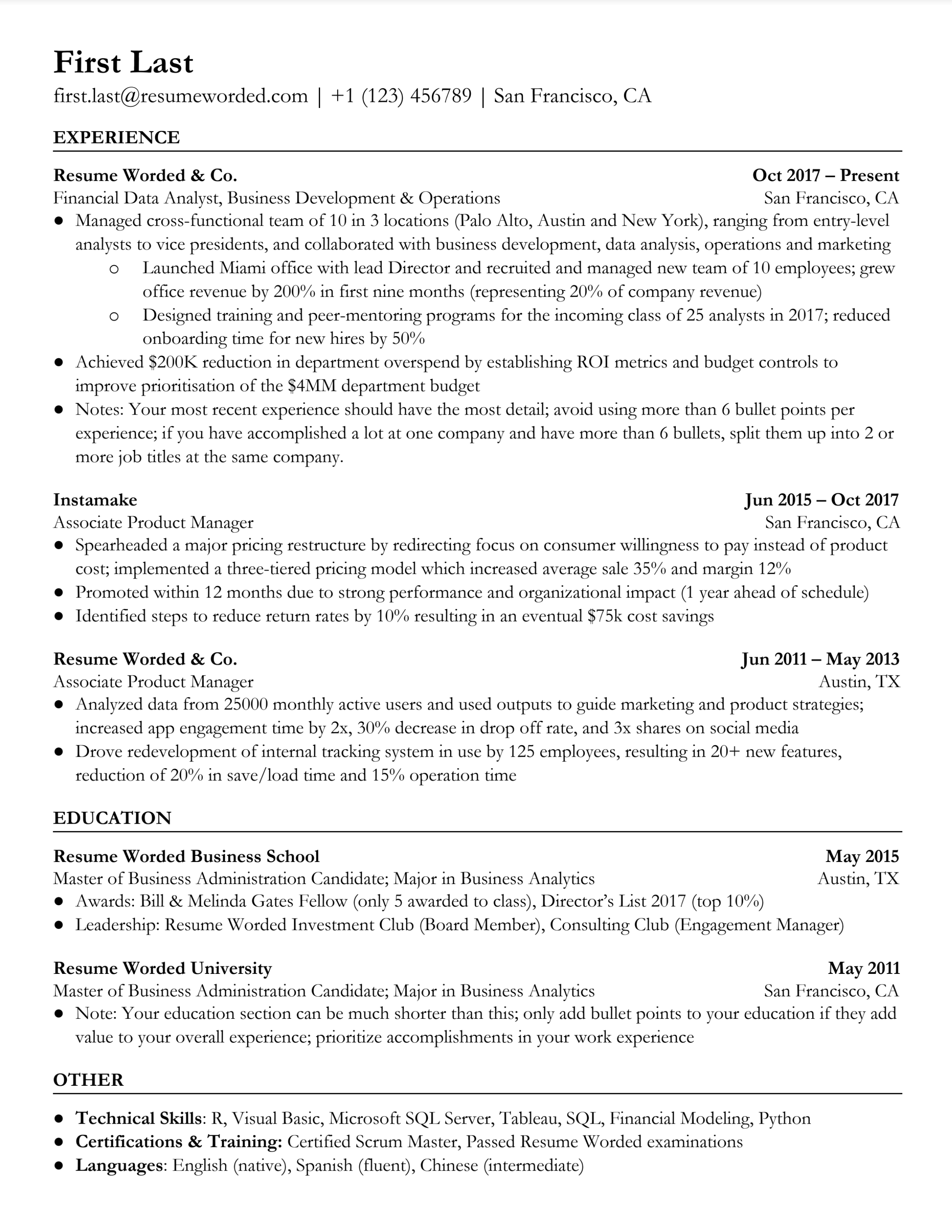
This resume template is suitable for experienced hires or mid-level hires. The education contains two examples of an education experiences, but only include one (your most recent one) if you're a senior level employee.
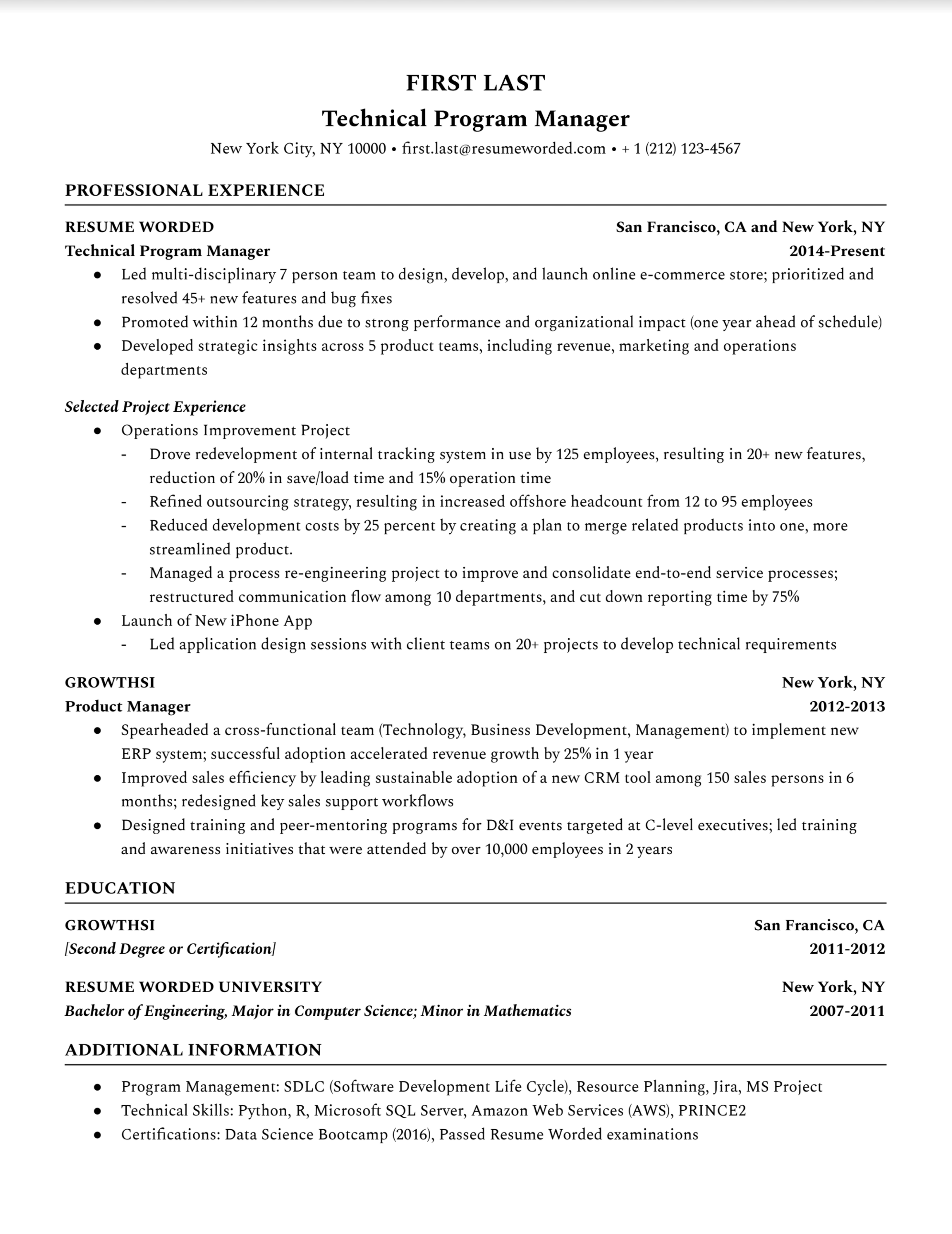
This template is clean, readable by resume screeners, and is effective at calling out key accomplishments and projects from specific work experiences. This would be useful if you have been at a company for a while, or been in a consulting-type of role, and want to point hiring managers to your most impressive accomplishments.
Some effective Nurse skills you can add to your resume include:
Popular skills we often see on resumes for Oncology Nurse positions include:
In comparison, skills we see on Intensive Care Nurse resumes include:
Depending on the specific role you apply to, you may need to emphasize different skill sets. Here are a few examples:
Examples of Nurse soft skills include Leadership, Working with Adolescents, Public Speaking, Organization Skills and Laboratory Skills.
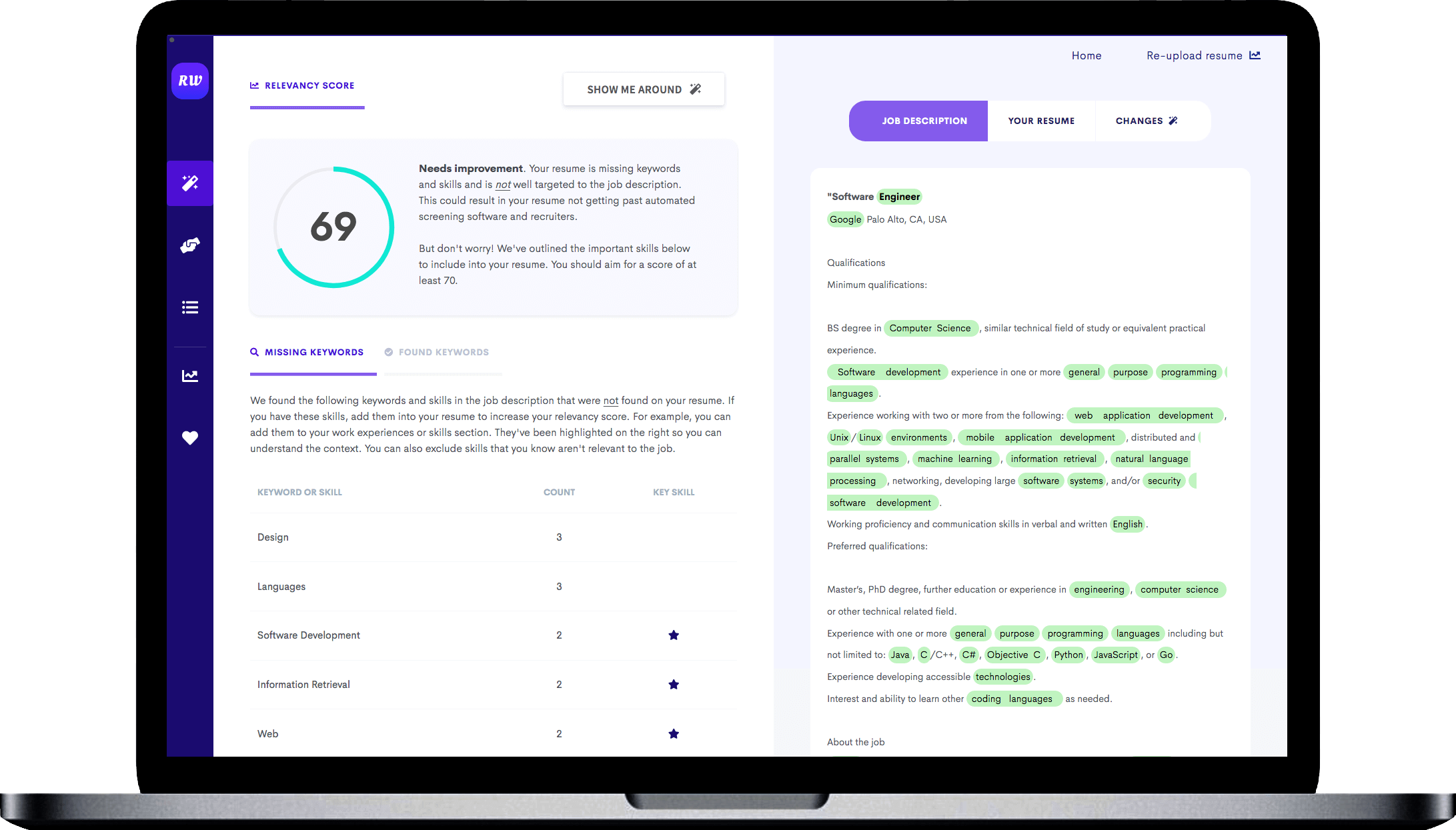
While the keywords above are a good indication of what skills you need on your resume, you should try to find additional keywords that are specific to the job. To do this, use the free Targeted Resume tool. It analyzes the job you are applying to and finds the most important keywords you need on your resume.
It is personalized to your resume, and is the best way to ensure your resume will pass the automated resume filters.

"My free resume review was truly eye-opening. I found out why I wasn't getting interviews and exactly what to add to get past resume screeners. I've already had way more callbacks since I used it. I recommend it to all my friends who are job searching."

"Probably the best thing I've done this year. Showed me what my strengths were and the jobs and industries I should be focusing on. The most impactful part though was how it identified this spiral I'd been doing subconsciously - yikes, freakishly accurate."

Thank you for the checklist! I realized I was making so many mistakes on my resume that I've now fixed. I'm much more confident in my resume now.